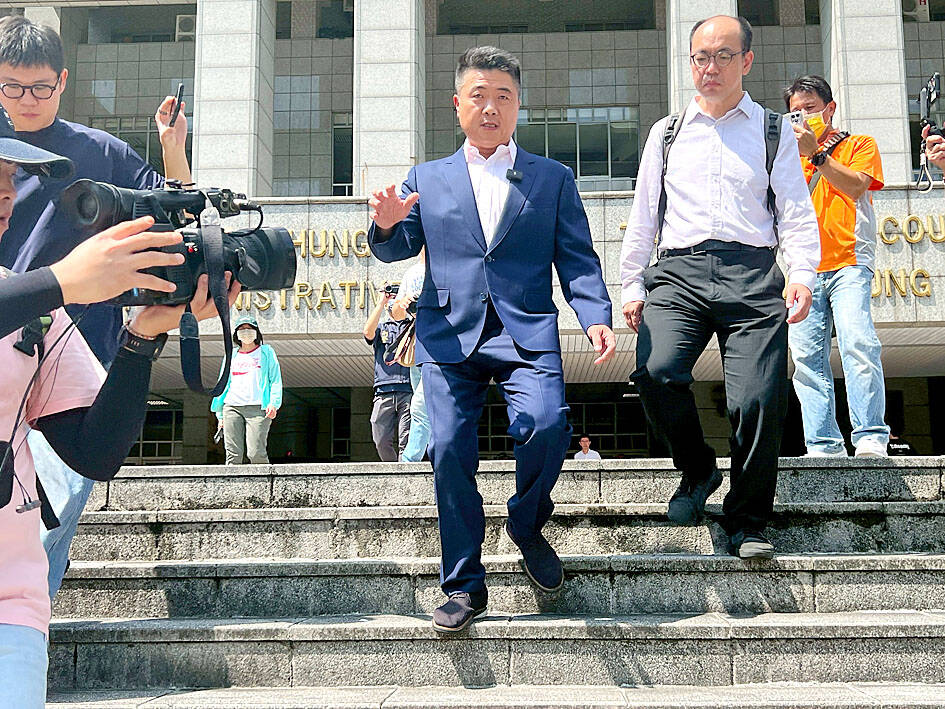The High Court’s Taichung Branch yesterday rejected an appeal by Chinese Nationalist Party (KMT) Legislator Yen Kuan-heng (顏寬恒), upholding his prison sentence of eight years and four months for corruption and related crimes.
The court said the corruption conviction could still be appealed to the Supreme Court, so the opposition lawmaker’s seat in the Legislative Yuan is not immediately affected.
Yen used a sham house transaction with a design company to hide the illegal occupation of state-owned land in Taichung’s Shalu District (沙鹿), prosecutors said.

Photo: Liao Yao-tung, Taipei Times
Yen and construction company head Lin Chin-fu (林進福) arranged a NT$45.41 million (US$1.5 million) “loan” to design company head Chang Yu-ting (張于廷), who then used the money to purchase the property, they said.
Yen used Lin as a proxy to illegally collect NT$1.08 million in Legislative Yuan staff salaries, prosecutors said, citing account records such as a “Yen collection and payment summary” as key evidence of a contravention of the Anti-Corruption Act (貪污治罪條例).
In July last year, the Taichung District Court convicted Yen of corruption, sentencing him to seven years and 10 months in prison, and stripping him of his civil rights for three years.
It added a six-month term for document forgery, convertible to a fine.
However, the district court found Yen not guilty of unauthorized occupation of publicly owned land.
The High Court’s Taichung Branch upheld those findings yesterday, saying the forgery and land encroachment rulings are final, and ordering Yen and Lin to be restricted from leaving Taiwan for eight months.
Outside the courthouse, Yen said he “cannot accept the verdict,” which he described as “judicial persecution.”
He also argued that assistant duties and salary disbursements were “entirely under Lin Chin-fu’s control.”
Regarding the house sale, Yen said it was “a real transaction without any falsehood, and all money flows were presented.”

SHIPS, TRAINS AND AUTOMOBILES: The ministry has announced changes to varied transportation industries taking effect soon, with a number of effects for passengers Beginning next month, the post office is canceling signature upon delivery and written inquiry services for international registered small packets in accordance with the new policy of the Universal Postal Union, the Ministry of Transportation and Communications said yesterday. The new policy does not apply to packets that are to be delivered to China, the ministry said. Senders of international registered small packets would receive a NT$10 rebate on postage if the packets are sent from Jan. 1 to March 31, it added. The ministry said that three other policies are also scheduled to take effect next month. International cruise ship operators

NUMBERS IMBALANCE: More than 4 million Taiwanese have visited China this year, while only about half a million Chinese have visited here Beijing has yet to respond to Taiwan’s requests for negotiation over matters related to the recovery of cross-strait tourism, the Tourism Administration said yesterday. Taiwan’s tourism authority issued the statement after Chinese-language daily the China Times reported yesterday that the government’s policy of banning group tours to China does not stop Taiwanese from visiting the country. As of October, more than 4.2 million had traveled to China this year, exceeding last year. Beijing estimated the number of Taiwanese tourists in China could reach 4.5 million this year. By contrast, only 500,000 Chinese tourists are expected in Taiwan, the report said. The report

The Forestry and Nature Conservation Agency yesterday launched a gift box to market honey “certified by a Formosan black bear” in appreciation of a beekeeper’s amicable interaction with a honey-thieving bear. Beekeeper Chih Ming-chen (池明鎮) in January inspected his bee farm in Hualien County’s Jhuosi Township (卓溪) and found that more than 20 beehives had been destroyed and many hives were eaten, with bear droppings and paw prints near the destroyed hives, the agency said. Chih returned to the farm to move the remaining beehives away that evening when he encountered a Formosan black bear only 20m away, the agency said. The bear

HORROR STORIES: One victim recounted not realizing they had been stabbed and seeing people bleeding, while another recalled breaking down in tears after fleeing A man on Friday died after he tried to fight the knife-wielding suspect who went on a stabbing spree near two of Taipei’s busiest metro stations, Taipei Mayor Chiang Wan-an (蔣萬安) said. The 57-year-old man, identified by his family name, Yu (余), encountered the suspect at Exit M7 of Taipei Main Station and immediately tried to stop him, but was fatally wounded and later died, Chiang said, calling the incident “heartbreaking.” Yu’s family would receive at least NT$5 million (US$158,584) in compensation through the Taipei Rapid Transit Corp’s (TRTC) insurance coverage, he said after convening an emergency security response meeting yesterday morning. National